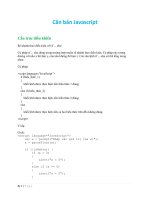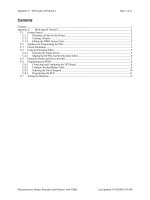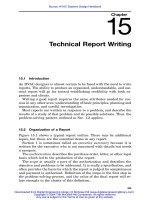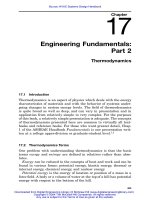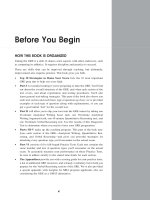Tài liệu List Of PLI Routines part 2 pptx
Bạn đang xem bản rút gọn của tài liệu. Xem và tải ngay bản đầy đủ của tài liệu tại đây (56.87 KB, 12 trang )
[ Team LiB ]
B.2 Access Routines
Access routines are classified into five categories: handle, next, value change link, fetch,
and modify routines.
B.2.1 Handle Routines
Handle routines return handles to objects in the design. The names of handle routines
always starts with the prefix acc_handle_. See Table B-1
.
Table B-1. Handle Routines
Return
Type Name Argument List Description
handle acc_handle_by_name (char *name, handle
scope)
Object from name
relative to scope.
handle acc_handle_condition (handle object) Conditional
expression for
module path or
timing check
handle.
handle acc_handle_conn (handle terminal); Get net connected
to a primitive,
module path, or
timing check
terminal.
handle acc_handle_datapath (handle modpath); Get the handle to
data path for an
edge-sensitive
module path.
handle acc_handle_hiconn (handle port); Get hierarchically
higher net
connection to a
module port.
handle acc_handle_interactive_scope ( ); Get the handle to
the current
simulation
interactive scope.
handle acc_handle_loconn (handle port); Get hierarchically
lower net
connection to a
module port.
handle acc_handle_modpath (handle module, char
*src, char *dest); or
(handle module, handle
src, handle dest);
Get the handle to
module path whose
source and
destination are
specified. Module
path can be
specified by names
or handles.
handle acc_handle_notifier (handle tchk); Get notifier register
associated with a
particular timing
check.
handle acc_handle_object (char *name); Get the handle for
any object, given its
full or relative
hierarchical path
name.
handle acc_handle_parent (handle object); Get the handle for
own primitive or
containing module
or an object.
handle acc_handle_path (handle outport, handle
inport);
Get the handle to
path from output
port of a module to
input port of
another module.
handle acc_handle_pathin (handle modpath); Get the handle for
first net connected
to the input of a
module path.
handle acc_handle_pathout (handle modpath); Get the handle for
first net connected
to the output of a
module path.
handle acc_handle_port (handle module, int
port#);
Get the handle for
module port. Port#
is the position from
the left in the
module definition
(starting with 0).
handle acc_handle_scope (handle object); Get the handle to
the scope
containing an
object.
handle acc_handle_simulated_net (handle
collapsed_net_handle);
Get the handle to
the net associated
with a collapsed
net.
handle acc_handle_tchk (handle module, int
tchk_type, char
*netname1, int edge1,
........);
Get the handle for a
specified timing
check of a module
or cell.
handle acc_handle_tchkarg1 (handle tchk); Get net connected
to the first argument
of a timing check.
handle acc_handle_tchkarg2 (handle tchk); Get net connected
to the second
argument of a
timing check.
handle acc_handle_terminal (handle primitive, int
terminal#);
Get the handle for a
primitive terminal.
Terminal# is the
position in the
argument list.
handle acc_handle_tfarg (int arg#); Get the handle to
argument arg# of
calling system task
or function that
invokes the PLI
routine.
handle acc_handle_tfinst ( ); Get the handle to
the current user
defined system task
or function.
B.2.2 Next Routines
Next routines return the handle to the next object in the linked list of a given object type
in a design. Next routines always start with the prefix acc_next_ and accept reference
objects as arguments. Reference objects are shown with a prefix current_. See Table B-2
.
Table B-2. Next Routines
Return
Type Name Argument List Description
handle acc_next (int obj_type_array[], handle
module, handle
current_object);
Get next object of a
certain type within a
scope. Object types such
as accNet or accRegister
are defined in
obj_type_array.
handle acc_next_bit (handle vector, handle
current_bit);
Get next bit in a vector
port or array.
handle acc_next_cell (handle module, handle
current_cell);
Get next cell instance in a
module. Cells are defined
in a library.
handle acc_next_cell_load (handle net, handle
current_cell_load);
Get next cell load on a
net.
handle acc_next_child (handle module, handle
current_child);
Get next module instance
appearing in this module
handle acc_next_driver (handle net, handle
current_driver_terminal);
Get next primitive
terminal driver that drives
the net.
handle acc_next_hiconn (handle port, handle
current_net);
Get next higher net
connection.
handle acc_next_input (handle path_or_tchk,
handle current_terminal);
Get next input terminal of
a specified module path
or timing check.
handle acc_next_load (handle net, handle
current_load);
Get next primitive
terminal driven by a net
independent of hierarchy.
handle acc_next_loconn (handle port, handle
current_net);
Get next lower net
connection to a module
port.
handle acc_next_modpath (handle module, handle
path);
Get next path within a
module.
handle acc_next_net (handle module, handle
current_net);
Get the next net in a
module.
handle acc_next output (handle path, handle
current_terminal);
Get next output terminal
of a module path or data
path.
handle acc_next_parameter (handle module, handle
current_parameter);
Get next parameter in a
module.
handle acc_next_port (handle module, handle
current_port);
Get the next port in a
module port list.
handle acc_next_portout (handle module, handle
current_port);
Get next output or inout
port of a module.
handle acc_next_primitive (handle module, handle
current_primitive);
Get next primitive in a
module.
handle acc_next_scope (handle scope, handle
current_scope);
Get next hierarchy scope
within a certain scope.
handle acc_next_specparam (handle module, handle
current_specparam);
Get next specparam
declared in a module.
handle acc_next_tchk (handle module, handle
current_tchk);
Get next timing check in
a module.
handle acc_next_terminal (handle primitive, handle
current_terminal);
Get next terminal of a
primitive.
handle acc_next_topmod (handle current_topmod); Get next top level module
in the design.
B.2.3 Value Change Link (VCL) Routines
VCL routines allow the user system task to add and delete objects from the list of objects
that are monitored for value changes. VCL routines always begin with the prefix
acc_vcl_ and do not return a value. See Table B-3
.

